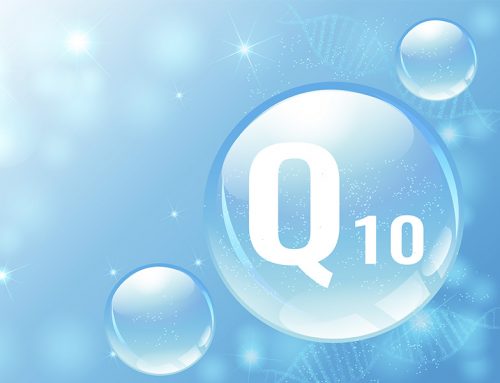
Supplementation with Coenzyme Q10 can increase brain mitochondrial concentrations and increase neuro-protective effects. In addition to providing antioxidant defense against free radical damage, Coenzyme Q10 is essential for the process of cellular energy production.
So, it seems clear that Coenzyme Q10 supplementation is not needed when we are young and healthy, in our teenage years and in our early 20’s. But … definitely … from our 20s onward, and increasingly as we get older, we need a well-formulated daily Coenzyme Q10 (preferably taken twice daily with meals) … or we need to take nutritional supplements that will enhance our bodies’ bio-synthesis of Coenzyme Q10. Or both.
Because there is no doubt that we need to maintain functional levels of Coenzyme Q10 in the cell membranes and in the mitochondria, particularly in the brain and muscle tissue. Coenzyme Q10 is essential in the process of cellular ATP energy production, and Coenzyme Q10 is the most important fat-soluble antioxidant protector of the cells [Littarru].
No nutrients proven to induce endogenous Coenzyme Q10 synthesis
Unfortunately, there is no good solid research showing that the increased intake of various nutrients will enhance the ageing body’s synthesis of Coenzyme Q10 [López-Lluch]. At the present time, we do not know of any way, except possibly regular exercise, to improve our bodies’ own production of Coenzyme Q10.
Nor is there any solid research showing that the increased intake of various nutrients will increase Coenzyme Q10 uptake from the diet and from supplements.
Professor López-Lluch, a bio-medical researcher at the University in Sevilla, Spain, has pointed to vitamin E and vitamin C supplements as possible candidates to increase the uptake and bio-availability of Coenzyme Q10. However, the available research data in support of vitamin E and vitamin C supplements are limited and far from unequivocal at this point [López-Lluch].
Coenzyme Q10 absorption and bio-availability
As Dr. William Judy, SIBR Research Institute, has shown, the absorption and bio-availability from even the best Coenzyme Q10 supplements is quite low. Moreover, Dr. Judy’s absorption studies have shown that the comparatively new ubiquinol supplements are not better absorbed – in some cases are less well-absorbed – than the best formulated Coenzyme Q10 supplements [Judy].
Low Coenzyme Q10 status in brain and muscle tissue
Meanwhile, we do have studies that show that low plasma and tissue Coenzyme Q10 concentrations (and, worse, Coenzyme Q10 deficiency) are a factor in several degenerative diseases associated with ageing. This association is especially noticeable with respect to neuromuscular disorders, some of them leading to the loss of full control of bodily movements [López-Lluch]. The difficulty we face, as we age, is the difficulty of keeping the Coenzyme Q10 concentrations in the brain and the muscle tissue at functional levels.
Coenzyme Q10 supplementation the only available treatment
Supplementation with scientifically documented and carefully formulated Coenzyme Q10 capsules is the only known effective remedy for disorders caused by Coenzyme Q10 deficiency.
- We don’t have any supplements or mechanisms to speed up our bodies’ own production of Coenzyme Q10.
- We don’t have special foods that we can eat to get enough extra Coenzyme Q10 in our diets.
- We don’t have any supplements or mechanisms to enhance the absorption and bio-availability of the Coenzyme Q10 supplements that we take.
No useful analogue versions of Coenzyme Q10
Moreover, we do not have any synthetic versions or derivative versions of Coenzyme Q10 that have been shown to be as effective as the Coenzyme Q10 that is fermented from yeast and that is bio-identical with the Coenzyme Q10 that our bodies produce.
To be specific, Professor López-Lluch’s summary of the relevant research literature has suggested that neither the Coenzyme Q10 derivative MitoQ nor the synthetic benzoquinone Idebenone has had the desired beneficial effects on neurodegenerative diseases. In some studies, the analogue compounds have had undesirable effects:
- acting as a pro-oxidant and causing oxidative damage
- inhibiting mitochondrial complex I activity
- increasing endothelial cell apoptosis [López-Lluch]
Remember: the free radical theory of ageing posits that the accumulation of free radical damage to cells and especially to cell DNA over time is associated with ageing and age-related chronic diseases. The brain and muscle tissues need protection against oxidative damage, and Coenzyme Q10 is an effective fat-soluble antioxidant.
Best to stay with the natural form of Coenzyme Q10
After all, Coenzyme Q10 in vegetable oils in soft-gel capsules that was used as a daily supplement in randomized controlled trials has yielded statistically significant (and clinically significant) results:
- Q-Symbio study [Mortensen 2014] – 300 milligrams of Coenzyme Q10 daily reduced the incidence of death from heart disease, reduced the number of major adverse cardiovascular events, and reduced the number of unplanned hospitalizations in patients diagnosed with chronic heart failure.
- KiSel-10 study [Alehagen 2013] – 200 milligrams of Coenzyme Q10 in combination with 200 micrograms of high-selenium yeast daily reduced the risk of dying from heart disease, decreased the levels of bio-markers for oxidative damage and inflammation, and improved quality of life for live-at-home elderly citizens.
- Gulf War Illness study [Golomb 2014] – 100 milligrams of Coenzyme Q10 daily improved physical function and symptoms in veterans diagnosed with Gulf War Illness.
- Congestive Heart Failure study [Munkholm 1999] – 200 milligrams of Coenzyme Q10 daily improved stroke index at rest and at work, decreased pulmonary artery pressure at rest and at work, decreased the pulmonary capillary wedge pressure at rest and at work, suggesting improvement in left ventricular performance.
Sources
Alehagen, U., Johansson, P., Björnstedt, M., Rosén, A., & Dahlström, U. (2013). Cardiovascular mortality and N-terminal-proBNP reduced after combined selenium and coenzyme Q10 supplementation: a 5-year prospective randomized double-blind placebo-controlled trial among elderly Swedish citizens. International Journal of Cardiology, 167(5), 1860-1866.
Golomb, B. (2014). Coenzyme Q10 and gulf war illness. Neural Computation, 26(11), 2594-651.
Judy, W. V., Stogsdill, W. W., Judy, D. S., & Judy, J. S. (2007). Coenzyme Q10: Facts or Fabrications? Natural Products Insider. Retrieved from http://www.zmc-usa.com/docs/CoQ10_Facts_or_Fabrications.pdf.
Judy, W. V. (2017). Private communication.
Littarru, G. P. (1994). Energy and Defense: Facts and Perspectives on Coenzyme Q10 in Biology and Medicine. Rome: Casa Editrice Scientifica Internationale.
López-Lluch, G., Rodríguez-Aguilera, J. C., Santos-Ocaña, C., & Navas, P. (2010). Is coenzyme Q a key factor in aging? Mechanisms of Ageing And Development, 131(4), 225-235.
Mortensen, S. A., Rosenfeldt, F., Kumar, A., Dolliner, P., Filipiak, K. J., Pella, D., & Littarru, G. P. (2014). The effect of coenzyme Q10 on morbidity and mortality in chronic heart failure: results from Q-SYMBIO: a randomized double-blind trial. JACC. Heart Failure, 2(6), 641-649.
Disclaimer: The information presented in this review article is not intended as medical advice and should be not used as such.









Leave A Comment